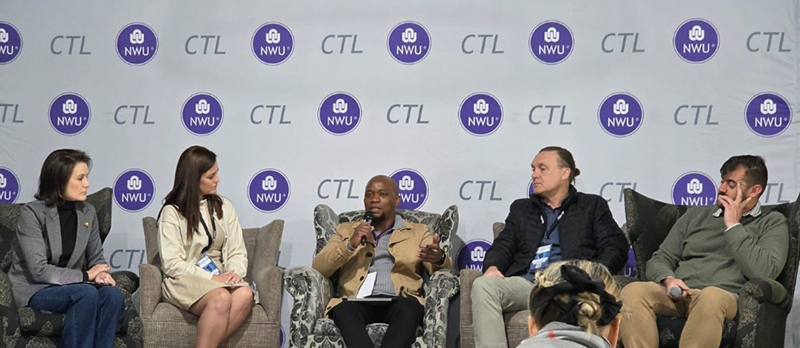At the 2025 Teaching and Learning Conference of the North-West University’s (NWU’s) Centre for Teaching and Learning (CTL), members of the TELIT-SA research entity demonstrated why they are at the forefront of educational innovation.
Themed “Reimagining the future of teaching and learning: synergy, sustainability and success”, the conference served as a dynamic platform for TELIT-SA scholars to share research-driven strategies that shape the evolving landscape of higher education.
Prof Clarise Mostert delivered a thought-provoking presentation titled “Enhancing global employability skills through project-based learning and international collaboration”. Her work underscored the importance of equipping students with globally relevant skills through practical, cross-border educational experiences, positioning them for success in an increasingly interconnected world.
In another impactful session, Prof Lilian Nwosu explored the role of artificial intelligence in shaping academic assessment. Her presentation, “Artificial intelligence proficiency and accounting exam papers: implications for assessment”, delved into the complex relationship between AI, academic integrity and curriculum development. She called attention to the urgent need for frameworks that balance technological advancement with ethical responsibility in assessment practices.
Dr Kezel Klinck addressed the student experience in her presentation, “Navigating the new normal: student perceptions of emerging technologies at a higher education institution”. Her research revealed key insights into how students are engaging with new technologies in the post-pandemic academic environment, offering valuable implications for institutions striving to enhance digital inclusivity and learning support.
A highlight of the conference was a panel discussion titled “Reimagining higher education: AI’s role in shaping the future of learning”, featuring Prof Liandi van den Berg, director of TELIT-SA, along with Dr Thamie Ndlovu and Yolande Steward. Their discussion centred on the ethical integration of artificial intelligence in education and the transformative potential it holds – if implemented thoughtfully and responsibly. The session received an award as one of the best of the conference, a testament to the relevance and quality of the perspectives shared.
Reflecting on the panel and the broader conference, Prof Van den Berg commented, “AI should never replace the human element in education. It must serve as a tool that amplifies the educator’s ability to connect, inspire and personalise learning. Our focus at TELIT-SA is to ensure that technological innovation remains aligned with human-centred, ethical teaching practices.”
She added that the outstanding contributions from TELIT-SA members not only showcased their research excellence, but also reinforced the entity’s commitment to reimagining teaching and learning for a sustainable, inclusive future. She said that, through evidence-based scholarship and a strong focus on responsible innovation, TELIT-SA continues to lead the way in shaping higher education in South Africa and beyond.

A highlight of the conference was a panel discussion titled “Reimagining higher education: AI’s role in shaping the future of learning”.
